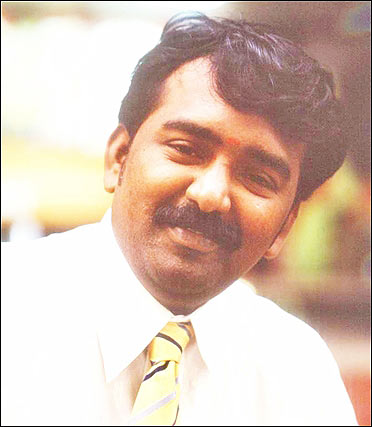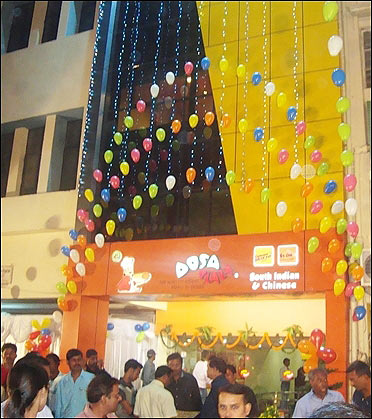Fourty-four-year-old Samar Gupta has hit midlife crisis. “I’m certainly the right age for it,” he says. The owner of Trikaya Agriculture Pvt. Ltd, the largest supplier of boutique fruit and vegetables in the Mumbai-Pune area, has many roads in front of him, and he’s not sure which one his business should take. In the last decade or so, Trikaya has grown from a business kissing the red line to one that pulls in Rs6 crore revenue, supplies to every major institutional client you could throw a dart at, and is growing at 35% per year. But now what?

Gupta is the consummate gentleman farmer, driven by the lure of the exotic and a genuine love for growing things. “My idea of a good holiday is a plant holiday. What would I do hanging out on a beach somewhere? I only travel to tropical countries such as Thailand, which is horticulturally way ahead of us,” says Gupta.
We meet at his club, the Bombay Gymkhana, where the slightly built Mayo grad is hanging out with a dog-eared copy of Niall Ferguson’s The War of the World. Over multiple pints of Coca-Cola, the history buff attempts to plough through the past, present and future of his agri-retail business.
The present-day version of the 160 acres spread across five farms in Talegaon, Chinchi and the Konkan, grew out of a weekend 5.5-acre getaway that was first set up by Gupta’s father, Ravi, in 1987. The then head of Trikaya Advertising India Ltd (the family sold the business to Grey Worldwide in 1994) was a weekend farmer, who fled Mumbai two days of the week for the rural outpost. Slowly, he began experimenting with growing temperate vegetables that were completely antithetical to the dry, tropical environment of the area. The work was difficult; it was a time when general demand for their produce, which was expensive, was zero; boutique vegetables were only nestled by the menus of five-star hotels, and even they simply imported produce. The younger Gupta joined the business on the marketing side, and soon became a 50% partner in it with his father. “For my dad, it was always on a weekend basis. Just when the business turned the corner, nine years ago, he passed away,” says Gupta.
Their fortunes turned just as the effects of the New Economy began to take effect in the lives of everyday people, and the father and son duo discovered new ways to market their produce. “Our first breakthrough was when we realized that anyone looking for our kind of vegetables would go looking at Crawford Market (Mumbai’s main fruit and vegetable market), and that we could set up a stall there to sell directly.” Gupta still hangs on to the very first bill Trikaya made out to Mumbai’s Taj Hotel for a kg of iceberg lettuce, delivered to the hotel in his father’s Contessa car.
“The petrol bill cost me more than what we got for that sale,” he remembers.
Today, Trikaya’s produce ranges more than 150 items, from 15 varieties of lettuce, to broccoli, asparagus, avocado, leek, exotic fruit such as dragon fruit, mulberry, rambutan, the off-season Thai mango, Samruddhi, and various herbs, sprouts and flowers. Their biggest volumes come from broccoli and iceberg lettuce, which are found in every burger dished out by McDonald’s. It’s a capital-intensive business that burns easily, but Gupta is completely self-financed and his client roster runs up to more than 75 institutions, including Kentucky Fried Chicken, Subway, Domino’s, five-star hotels and restaurants such as Grand Hyatt, Taj Mahal Palace and Tower, The Oberoi, and Indigo, various ship chandlers and air kitchens. On the other side, sits the retail end of Gupta’s business, which is a round-up of the city’s supermarket chains, including Big Bazaar (they supply through a contractor), HyperCity, Godrej’s Nature’s Basket and Foodland Spinach. In fact, they have a knack for getting on everyone’s list. A team from More, the Birla retail venture scheduled to kick-start in Pune, has already visited the farm in Talegaon.
But, with big retail also comes big challenges. Gupta’s business is built on the strength of being able to deliver what most farmers can’t and, therefore, dictate prices. But, it’s a business plan that leaves him open to a lot of pushes and shoves from various corners. A few years ago, the head of distribution centre Radhakrishna Foodland was pressuring Trikaya to offer preferential prices: “They all say, ‘I’ll develop someone else and shut you down’, without realizing how difficult it is to learn how to grow iceberg lettuce in the middle of summer,” says Gupta. The company has also been elbowed by the likes of Reliance to cut the prices of their vegetables, but as long as there’s no one else doing what he does, Gupta’s safe. But that comfort factor comes with an expiry date.
At least twice he was forced to discontinue a line of vegetables because someone else began growing them cheaper. “Our biggest challenge is the young Maharashtrian farmer, who’s well-educated, and is able to do what we do and get into a price war, because I won’t get into the business of selling something for Rs4 just because another guy is doing it for Rs5,” he says.
Gupta’s fighting plan is to innovate, and add value. So, three years ago, he set up Clearwater Farms, the processing and canning arm of the business, which manufactures gourmet processed foods such as pickled onions, paprika and jalapenos in brine, preserved artichokes, etc. “We know the pyjama farmer is always out there, so we’ve got to keep moving. If the canning and processing goes right, I’m looking at a Rs40 crore market, which I think will overwhelm the growing side of our market,” he says.
And that’s when you hit the midlife crisis. Gupta is single, with no dependents and no concrete transition plan; neither of his two siblings is interested in the business. “I’ll never die,” he jokes. But he’s also hesitant to grow beyond a certain point. He has cast off the idea of spreading out the farming to cities such as New Delhi or Bangalore, because of the lack of management control. And as the processed foods business kicks off, Gupta insists it’s also time to look at a more philanthropic side of life: perhaps start a botanical garden, or maybe adopt a traffic island and do these up with ornamental plants. Gupta admits he’s not sure which path to take, and says he’s at a cusp. “I’m not going to take the money with me, and I want my business to be less bottomline driven, but I’m also enough of a baniya to stick around while the price is right.”
CURRICULUM VITAE
Name: Samar Gupta
Born: 1963 (in Mumbai)
Education: Graduated from Tufts University, Medford, UK.
Work Profile: Ran a family printing press for three years, then worked with Pheroze Engineer on Real Value Fire Extinguishers for five years, before joining Trikaya Agriculture Pvt. Ltd 16 years ago. Now owns both Trikaya Agriculture and Clearwater Farms.
Interests: Collects stapeliads, rare fruit and cactii
Source: livemint.com


